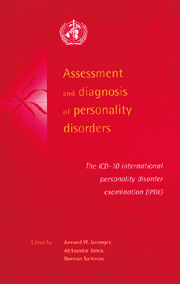 Assessment and Diagnosis of Personality Disorders
Assessment and Diagnosis of Personality Disorders Preface
Published online by Cambridge University Press: 04 August 2010
Summary
One of the major goals of the World Health Organization's (WHO) Mental Health Programme has been the development of a common language for worldwide use by psychiatrists and other mental health professionals. The WHO/NIH Joint Project on Diagnosis and Classification of Mental Disorders, Alcohol-and Drug-related Problems is the most recent endeavour in this programme. It has developed a number of diagnostic instruments for the assessment of mental disorders in different cultures and tested them for their cross-cultural applicability, reliability and validity.
One of these instruments, the Composite International Diagnostic Interview (CIDI), is highly structured and intended for use by lay interviewers in epidemiological studies. Another, the Schedules for Clinical Assessment in Neuropsychiatry (SCAN), is a semi-structured interview for use by clinicians, i.e., those capable of making independent psychiatric diagnoses. Since neither interview covers personality disorders, it was necessary to develop an instrument to assess them according to criteria in the latest classification systems.
The new instrument, the International Personality Disorder Examination (IPDE), has been developed from the Personality Disorder Examination (PDE), which was modified for international use and compatibility with the International Classification of Diseases, 10th revision (ICD-10), and the American Psychiatric Association Diagnostic and Statistical Manual of Mental Disorders, fourth edition (DSM-IV). The current version of the IPDE has been produced in two modules, one for ICD-10 and one for DSM-IV criteria for personality disorders.
- Type
- Chapter
- Information
- Assessment and Diagnosis of Personality DisordersThe ICD-10 International Personality Disorder Examination (IPDE), pp. xi - xiiPublisher: Cambridge University PressPrint publication year: 1997


